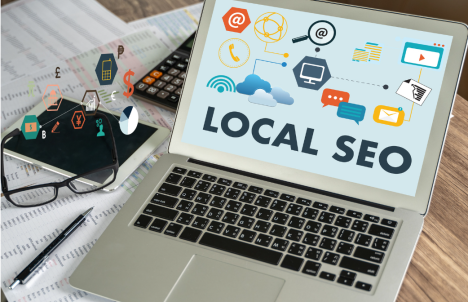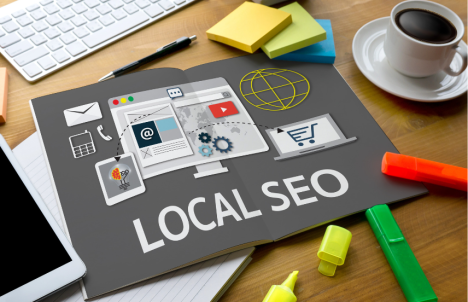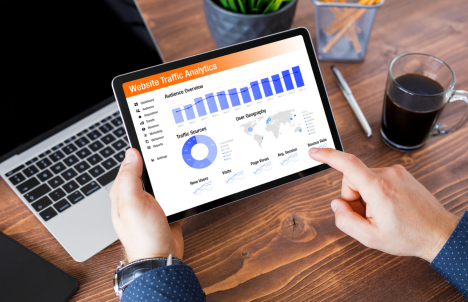Do you want to increase visibility and sales for your small business in the local area? Are you searching for the most effective local SEO strategies to help increase the discoverability of your brand online? This definitive guide to local SEO for small businesses will show you the way!
In today’s digital age, having a strong online presence is crucial for small businesses. With more consumers turning to search engines to find local businesses, having a solid local SEO strategy can make all the difference in driving traffic and increasing sales. However, many small business owners are unsure of where to begin with local SEO and how to optimize their online presence to attract local customers.
That’s where our guide comes in. We’ll provide an in-depth overview of local SEO and share actionable tips so that your small business can stay ahead of the competition. With these tips, you’ll be well-equipped with proven strategies and tactics to ensure that your website ranks higher when customers search locally.
. . .
Contents
. . .
Why You Should Adopt a Local SEO Strategy

- 78% use the Internet to find information about local businesses in their area more than once a week…and 21% are searching locally every day, according to BrightLocal’s most recent local consumer survey.
- Reviews are a highly impactful part of the local search experience and in 2021, 77% of local consumers said they always or regularly read reviews when searching for local businesses.
- 46% of all Google users search for local information.
- 72% of shoppers visited a store within five miles (8.05 km) after doing a local SEO search.
Overall, adopting a local SEO strategy is a smart investment for small businesses looking to grow and succeed in today’s digital marketplace.
Understanding Local SEO

Local SEO & Its Importance
Local SEO (search engine optimization) is the process of optimizing a business’s online presence to improve its visibility and ranking in local search results. Local SEO strategies are focused on attracting potential customers in a specific geographic area by targeting location-specific keywords, creating locally relevant content, and optimizing business listings and profiles on search engines and online directories.
The goal of local SEO is to help businesses appear in the top search results when people search for local products or services, driving more website traffic, foot traffic, and sales to the business.
Traditional SEO vs. Local SEO
Traditional SEO and local SEO campaigns have some key differences in terms of their goals, strategies, and target audience.
The primary goal of traditional SEO (aka, organic search) campaigns is to improve a website’s visibility and ranking in search engine results pages (SERPs) for relevant keywords and phrases, regardless of the user’s location. These campaigns are typically aimed at a wider, more general audience and are focused on optimizing website content, improving website structure and design, and building high-quality backlinks to improve the website’s overall authority and relevance.
However, local SEO campaigns are specifically designed to improve a business’s visibility and ranking in local search results for location-specific keywords and phrases. These campaigns are targeted at potential customers who are searching for businesses in a specific geographic area and often prioritize optimizing for local search queries and local search platforms like Google Business Profile in addition to website optimization.
Importance of a Google Business Profile

Google Business Profile (GBP), formally known as Google My Business, is an essential component of local SEO, as it provides a way for businesses to share important information with potential customers, including their address, phone number, website, hours of operation, and reviews. GBP is a free online tool offered by Google that allows businesses to manage their online presence across various Google platforms, including Google Search, Google Maps, and Google Local Pack.
Here are several reasons why a Google Business Profile is important for local SEO:
- Improved visibility: By creating and optimizing a GBP, businesses can increase their visibility in Google Search and Google Maps results, which can help them attract more local customers.
- Enhanced customer engagement: A GBP allows businesses to interact with customers through messages, reviews, and Q&As, which can help build customer trust and loyalty.
- Local relevance: A GBP provides businesses with the ability to include location-specific information, such as their service area and business category, which can help them appear in more relevant local search results.
- Competitive advantage: By optimizing a GBP and actively engaging with customers, businesses can stand out from competitors and improve their online reputation.
- Insights and analytics: A GBP provides businesses with valuable insights and analytics, such as search queries, views, and actions, which can help them track and measure the effectiveness of their local SEO efforts.
Overall, a Google Business Profile is an essential tool for businesses looking to improve their online presence and visibility in local search results. By optimizing their GBP and actively engaging with customers, businesses can enhance their local relevance, improve customer engagement, and gain a competitive advantage in their local market.
Keyword Research

Importance of Keyword Research for Local SEO
Keyword research is a critical component of local SEO, as it helps businesses identify and anticipate specific keywords and phrases that potential customers are using to search for products or services in their local area. Here are some key reasons why keyword research is important for local SEO:
- Targeted traffic: By identifying the right keywords and phrases, businesses can attract more targeted traffic to their website, which can lead to higher-quality leads and conversions.
- Competitive advantage: By targeting location-specific keywords, businesses can gain a competitive advantage over other businesses that are not optimizing for local search.
- Local relevance: Keyword research can help businesses identify the most relevant and commonly used search terms in their local area, which can help them create locally relevant content and optimize their website for local search.
- Content optimization: Keyword research can also help businesses optimize their website content, including on-page elements such as headings, meta descriptions, and image alt tags, to improve their relevance and visibility in local search results.
- Measurable results: Keyword research can provide businesses with valuable insights and data on search volume, competition, and ranking difficulty, which can help them track and measure the effectiveness of their local SEO efforts.
By understanding the keywords and phrases that are most relevant to their business and target audience, businesses can optimize their website and online presence to improve their visibility in local search results and attract more local customers.
Types of Keywords to Target for Local SEO
When targeting keywords for local SEO, it’s important to consider both the relevance and search volume of each keyword. Businesses should aim to target keywords that are highly relevant to their products or services and have a reasonable amount of search volume. They should also avoid targeting keywords that are too broad or generic, as these may be too competitive to rank for in local search results.
There are several types of keywords that businesses can target for local SEO:
- Location-based keywords: These are keywords that include the name of a specific city, town, neighborhood, or other geographic location (e.g., “Italian restaurant in downtown Seattle” or “auto repair shop near me”).
- Service-based keywords: These are keywords that describe the specific products or services that a business offers (e.g., “plumbing services” or “personal injury lawyer”).
- Branded keywords: These are keywords that include the name of a specific brand or business (e.g., “Starbucks coffee” or “Best Buy electronics”).
- Long-tail keywords: These are longer, more specific phrases that are often used by customers who are further along in the buying process (e.g., “best Italian restaurant for date night” or “emergency plumbing services on weekends”).
- Competitor keywords: These are keywords that include the names of competitors or similar businesses (e.g., a local pizza restaurant might target keywords like “domino’s pizza delivery” or “Papa John’s coupon codes”).
By targeting the right keywords, businesses can improve their visibility in local search results, attract more targeted traffic to their website, and ultimately drive more sales and revenue.
Tools for Keyword Research
When selecting a keyword research tool, businesses should consider their specific needs and budget. While some tools may be more comprehensive and advanced than others, there are many great options available for businesses of all sizes and budgets. Here are some popular options for conducting keyword research for local SEO:
- Google Keyword Planner: This is a free tool provided by Google that allows businesses to research and analyze keyword ideas based on search volume, competition, and other metrics. It’s an excellent tool for identifying relevant keywords and phrases for local SEO campaigns.
- SEMrush: This is a popular paid tool that provides businesses with comprehensive keyword research and analysis capabilities. It offers a wide range of features, including keyword suggestions, competitive analysis, and search volume data.
- Ahrefs: This is another paid tool that offers advanced keyword research and analysis capabilities, including keyword difficulty analysis, competitor research, and search volume data.
- Moz Keyword Explorer: This is a keyword research tool offered by Moz, which provides businesses with in-depth keyword analysis and suggestion features, including search volume, difficulty, and opportunity metrics.
- KWFinder: This tool offers a user-friendly interface and provides businesses with keyword suggestions, search volume data, and competitive analysis features. It also offers unique features like the ability to analyze keyword difficulty, generate long-tail keywords, and track keyword rankings.
Ultimately, the key is to select a tool that provides relevant and accurate keyword data to help optimize your local SEO efforts.
On-Page Optimization

Importance of On-Page Optimization for Local SEO
On-page optimization is crucial for local SEO as it involves optimizing a website’s content and structure to improve its relevance and visibility in local search results. By incorporating local keywords, optimizing meta tags, and providing relevant and high-quality content, businesses can improve their chances of appearing in local search results and attracting more local customers.
How to Optimize Website Content for Local Search
Optimizing website content for local search is crucial for businesses that rely on local customers or operate in a specific geographic area. Here are some key tips for optimizing website content for local search:
- Use location-based keywords: Including location-based keywords in your website content can help search engines understand the geographic relevance of your business. Be sure to include your city, state, or region in your content wherever relevant.
- Optimize your meta tags: Meta tags (e.g., title tags and meta descriptions) provide important information to search engines about the content of your website. Be sure to include location-based keywords in your meta tags to help improve your local search rankings.
- Create local landing pages: If you have multiple locations or serve customers in multiple cities, consider creating landing pages that are optimized for each specific location. This can help improve your local search rankings and provide a better user experience for your customers.
- Create service & product pages: Service and landing pages can help improve the relevance and visibility of your website content for local search. Providing detailed information about your offerings and location can attract more local customers to your website, increase your website traffic, and ultimately drive more leads and sales for your business.
- Add internal links: Internal linking can help improve the relevance, authority, and crawlability of your website content. By linking to relevant pages within your website, you can improve the user experience, establish the relevance and authority of your website on particular topics, and improve the visibility of your website in search results.
- Include your NAP information: NAP stands for name, address, and phone number. Including your NAP information on your website can help improve your local search rankings and make it easier for customers to find and contact your business.
- Use schema markup: Schema markup is a type of code that helps search engines understand the content of your website. Including schema markup on your website can help improve your local search rankings and provide more detailed information to users about your business.
By optimizing your website content, businesses can attract high-quality leads, increase their visibility within their target market, and build their reputation and authority within their local community.
Off-Page Optimization

Importance of Off-Page Optimization for Local SEO
Off-page optimization is an essential component of local SEO for small businesses as it focuses on building a strong online reputation for a business through external sources. This helps search engines determine the authority and relevance of a business within a specific geographic area, which can have a significant impact on its local search rankings.
By investing in off-page optimization, businesses can improve their online visibility, attract more local customers, and establish themselves as credible and trustworthy businesses in their local community.
Managing Online Reviews
Managing online reviews is a critical component of off-page optimization for local search as positive reviews can help improve a business’s online reputation and search engine rankings, and ultimately drive more customers to their website or physical location. Here are some best practices for managing online reviews for local search off-page optimization:
- Claim and verify your business listings: Claiming and verifying your business listings on platforms like Google Business Profile and Yelp can help ensure that you have control over your online reputation and can respond to customer reviews in a timely and appropriate manner.
- Encourage customers to leave reviews: Encouraging satisfied customers to leave reviews can help increase the volume and frequency of positive reviews for your business, which can improve your search engine rankings and online reputation.
- Respond to all reviews: Responding to both positive and negative reviews in a timely and professional manner can demonstrate to customers that you care about their feedback and are committed to providing excellent service.
- Address negative reviews: Addressing negative reviews promptly and professionally can help mitigate any negative impact on your online reputation and show potential customers that you take feedback seriously and are committed to resolving any issues.
- Monitor and analyze reviews: Regularly monitoring and analyzing reviews can provide insights into customer sentiment and help identify areas for improvement in your business operations and customer service.
By following these best practices, businesses can effectively manage their online reviews and improve their off-page optimization efforts for local search.
Local Advertising

Importance of Local Advertising for Local SEO
Local advertising is an important component of local SEO as it can increase the visibility of your business in local search results and attract more local customers to your website. By targeting specific geographic areas and demographics, you can improve the effectiveness of your advertising campaigns and increase the likelihood that your ads will be seen by people who are interested in your products or services.
Additionally, local advertising can help improve brand awareness and recognition in your local community, which can lead to increased traffic to your website and ultimately, more leads and sales for your business.
How Local Advertising Impacts Off-Page SEO
An important distinction that needs to be made is the difference between off-page local advertising vs. traditional local advertising. Local advertising is a part off-page optimization when it results in backlinks (i.e. mentions) from other websites. This can include a brand appearing on a podcast’s website with a backlink after initially appearing on their podcast or when a brand boosts one of their posts (with advertising dollars) about a great infographic and other sites decide to backlink to the brand.
However, traditional local advertising (that’s not considered off-page optimization) is when businesses are trying to promote their own brand, products, or services and there is no intent of improving off-page SEO. This can include online advertising that is strictly lead generation (e.g., someone wants you to buy a t-shirt or sign up for their e-newsletter) or strictly trying to promote your brand on television, radio, or a newspaper.
Types of Local Advertising
In traditional local advertising, there are several types of local advertising practices that businesses can use to improve their off-page optimization efforts, including:
- Online advertising: This includes advertising on social media platforms, such as Facebook, Instagram, and Twitter, as well as on online maps, local directories, and other websites that cater to a particular area.
- Print advertising: This includes advertising in local newspapers, magazines, and other printed media.
- Radio advertising: Advertising on local radio stations can be an effective way to reach a specific audience in a particular geographic area.
- Outdoor advertising: This includes advertising on billboards, bus shelters, and other outdoor media that are visible to people in a particular location.
- Events sponsorship: Sponsoring local events such as sports, music festivals or cultural events can help businesses reach a broader audience and increase their brand recognition.
- Local backlinks: Including backlinks from other local websites can help improve your local search rankings. Consider reaching out to local businesses, organizations, or directories to request backlinks to your website.
- Citations: Adding citations to websites that aren’t your own can help search engines validate the accuracy and credibility of your business information, such as your name, address, and phone number (NAP).
Each type of local advertising has its advantages and disadvantages, and businesses should carefully consider which channels are most effective for their target audience and budget. Ultimately, using a combination of these types of local advertising can help businesses indirectly improve their SEO and awareness efforts and establish a strong local online presence.
Tracking & Measuring Results

Importance of Tracking & Measuring Results
Tracking and measuring local SEO results is crucial for small businesses looking to improve their online presence and attract more local customers. By monitoring metrics such as website traffic, search engine rankings, and online reviews, businesses can determine the effectiveness of their local SEO strategies and make data-driven decisions about how to optimize their efforts.
Additionally, tracking and measuring results can help businesses stay ahead of the competition and adapt to changes in the local search landscape, ensuring that they remain visible and relevant to their target audience.
Tools for Tracking Local SEO Success
There are several tools that businesses can use to measure and track their local SEO results, including:
- Google Analytics: A free web analytics tool that provides insights into website traffic, user behavior, and other key metrics.
- Google Search Console: A free tool that provides information about search engine rankings, indexing status, and other data related to a website’s visibility in Google search results.
- Moz Local: A tool that helps businesses manage their local listings, monitor online reviews, and track local search rankings.
- SEMrush: A paid SEO tool that provides insights into website traffic, keyword rankings, and competitor analysis.
- BrightLocal: A tool that helps businesses manage and monitor their online reputation, track search engine rankings, and analyze local search results.
- Ahrefs: A paid SEO tool that provides insights into website traffic, backlinks, keyword rankings, and competitor analysis.
By using these tools, businesses can gain valuable insights into their local SEO performance and make data-driven decisions about how to optimize their off-page optimization efforts for local search.
Metrics to Track & Measure
There are several important metrics that businesses should track and measure to evaluate the success of their local SEO efforts, including:
- Local search engine rankings: Monitoring search engine rankings for relevant keywords in local search results can provide insight into the visibility and reach of your business to potential customers.
- Website traffic: Tracking website traffic from local searches can indicate the effectiveness of your local SEO strategies in driving visitors to your website.
- Online reviews and ratings: Monitoring online reviews and ratings can provide insights into customer sentiment and help identify areas for improvement in your business operations and customer service.
- Click-through rate (CTR): Measuring the CTR for local search results can indicate the effectiveness of your title tags and meta descriptions in attracting clicks from potential customers.
- Phone calls and directions: Tracking the number of phone calls and requests for directions from your Google Business Profile listing can indicate the effectiveness of your local SEO strategies in driving customer engagement.
- Conversion rate: Measuring the conversion rate for local search traffic can provide insights into the effectiveness of your website content and call-to-actions in converting visitors into customers.
By tracking and measuring these local SEO metrics, businesses can evaluate the effectiveness of their off-page optimization efforts and make data-driven decisions to improve their online visibility and attract more local customers.
. . .
Conclusion
Local SEO is an essential component of a successful digital marketing strategy for small businesses. To maximize visibility, local SEO should focus on building a consistent online presence, optimizing your website for search engines, and creating content that resonates with your local customers. With the right tactics and strategies in place, small businesses can achieve great results through local SEO that will drive leads, sales, and revenue for their business.
If you found this in-depth guide helpful but still need guidance on establishing a local SEO strategy, feel free to reach out for a free consultation and check out other blogs for similar content and advice. We’d love to get you started on your Synthesis Insights journey today!
Provide your email address below to receive our free 20 point local seo checklist.




